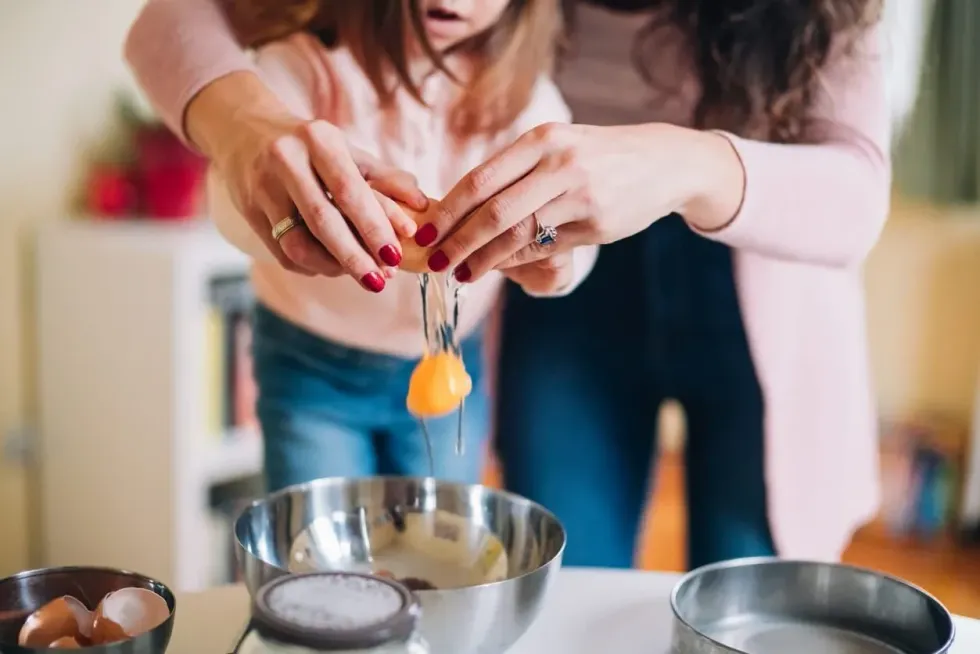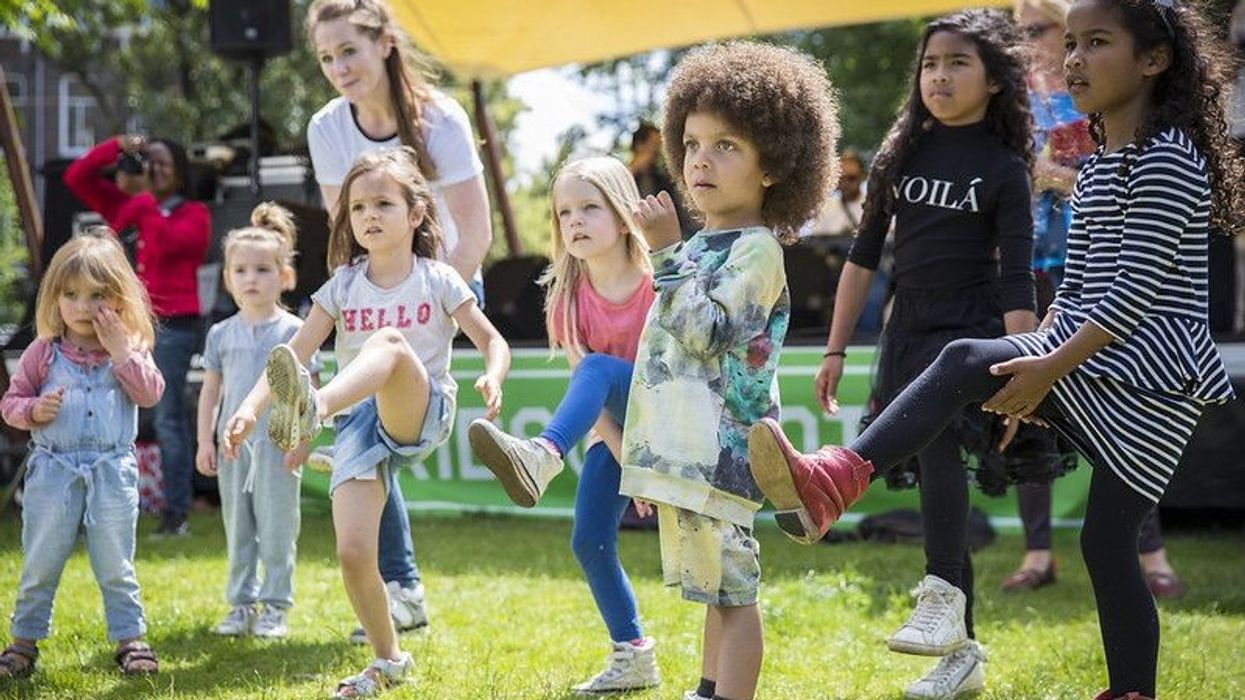Cooking with kids is more than just making meals; it's a valuable experience that mixes learning with fun family time. The kitchen turns into a place where kids can explore new foods, ingredients, and cooking methods out of curiosity.
Everyone, including beginners and young food lovers, can learn important life and school skills while making special memories together. Cooking as a team makes family bonds stronger and turns the kitchen into a place of shared adventures, bringing a sense of achievement and the happiness of being together.
These interesting reasons shed light on the joys behind cooking together as a family as well as showing how it is both an enjoyable journey and a learning experience. By preparing simple but tasty recipes, families can make these moments last and turn them into memories that bring parents and kids closer through a mix of flavors and playful kitchen moments.
The Joy Of Preparing Food Together
 Shutterstock
ShutterstockAllowing children to participate in the kitchen offers them a unique opportunity to contribute to the creation of their favorite dishes, whether it is cheesy bread or comforting and flavorful chicken soup. This involvement serves as an enjoyable and educational experience where they gain insight into the variety of foods and ingredients. Moreover, it provides a practical perspective on the dedication and effort required to prepare a meal for the family.
Cultivating A Love For Healthy Eating
Adding fresh ingredients to meals, like ripe tomatoes and crunchy vegetables, makes the concept of healthy eating more enjoyable for children. As they become more familiar with the different foods available, their curiosity and willingness to experiment with new flavors increase. This familiarity can lead them to develop a preference for wholesome and nutritious meals over time, fostering a healthy relationship with food that can last a lifetime.
Learning Lifelong Skills
Cooking is more than just a daily task; it's a valuable skill set that benefits individuals throughout their lives. Engaging in activities like filling muffin tins or carefully flipping a dish in a skillet, especially when done under guidance and in a safe setting, provides a solid base for lifelong culinary skills. Learning these basic cooking techniques early on fosters independence and instills a sense of confidence and self-sufficiency in individuals.
Cooking Across Cultures And Ages
Cooking with children offers a chance to explore different cultures through recipes from around the world. This activity is great for all family members, creating a shared space where everyone can learn and have fun.
It introduces kids to new tastes, ingredients, and ways of preparing food, helping them appreciate the wide variety of cultures. Through cooking, children learn about the culinary backgrounds of various countries and communities, discovering new spices and cooking methods.
Encouraging Creativity And Confidence
Choosing ingredients and making meals is a way to teach kids how to cook, but it also boosts their creativity and confidence. When they serve a dish they made themselves, filled with care and love, it's a big boost to their self-esteem.
This feeling of achievement is incredibly valuable. It helps kids feel proud of what they can do and encourages them to try new things, both in the kitchen and in life. Cooking becomes more than just preparing food; it's a way for people to grow and believe in themselves.
Kid-Friendly Recipes

Teaching kids to cook with simple recipes is a fun way to learn. It's more than just following easy steps; it's a chance to understand how to measure ingredients, the order of steps, and the importance of doing things correctly.
When kids make their food, like mixing cookie dough or making a pizza, they get excited. They enjoy the process of creating something that they can also eat. This approach makes cooking interesting and combines learning with enjoyable activities in the kitchen.
Fostering Communication
Cooking alongside each other in the kitchen fosters a space where parents and children can talk openly and work together. This setting is perfect for chatting and exchanging ideas while focusing on the task at hand.
As you both handle different parts of the cooking process, you can talk about the recipe, share personal stories, and have deep conversations. It’s a chance for kids to ask questions, share how they feel, and practice expressing their ideas. This interaction not only helps in making a delicious meal but also in strengthening communication skills and the parent-child bond.
Promoting Family Traditions
Cooking with your kids is a special way to share your family's recipes and traditions with them. Each family has unique culinary secrets, like a hidden ingredient in a favorite meal or a festive recipe passed down through generations.
When you cook these treasured dishes with your children, you're teaching them more than just how to cook. You're also sharing stories and memories linked to these meals, keeping family traditions alive. This helps create a strong sense of belonging and continuity.
Sensory Exploration And Development
Cooking exposes children to a wide range of sensory experiences, from the softness of dough that has risen overnight to the lively sizzle and crackle heard from a skillet. Engaging in activities like rolling out pizza dough, sprinkling spices into a pot, or feeling the comforting warmth of freshly baked bread plays a significant role in their cognitive development. These hands-on experiences with touch, taste, and smell enrich their understanding of the world and contribute to their learning in a deeply immersive way.
Math And Science In The Kitchen
 Shutterstock
ShutterstockThe kitchen can turn into a real-life classroom for math and science, making it a place where kids can learn about measuring, understand ratios, and witness chemical reactions happening right before their eyes. This hands-on experience helps turn complex ideas into something they can see and touch, making these lessons stick.
It's a great way for children to see the practical side of what they might learn in school, from seeing how baking soda reacts with vinegar to understanding how measurements ensure a recipe comes out just right.
Bonding Over Shared Experiences
Cooking together as a family is a powerful way to build stronger connections. It provides a special time for everyone to talk, share laughs, and work as a team towards making a tasty meal. This shared activity not only brings joy through the process itself but also gives a sense of achievement when enjoying the fruits of your collective effort.
It turns meal preparation into an opportunity for creating cherished memories and fostering a closer relationship among family members, making every dish more than just food, but a symbol of love and togetherness.
Teaching Planning And Organization
Meal preparation teaches kids valuable skills beyond just cooking, including planning, grocery shopping, and organizing. Kids can be involved early on, helping to find recipes, plan menus, and create shopping lists. Using specific tools, such as a muffin tin, can make the cooking process super easy and enjoyable.
This experience teaches them to make informed decisions and prioritize tasks. By preparing ingredients and tools in advance, they learn the importance of being organized and setting the stage for completing a course from start to finish. In advance, they learn the importance of being organized and setting the stage for completing a course from start to finish.
Enhancing Reading Comprehension
Reading recipes is a great way for kids to work on their reading skills. Recipes come with new words, abbreviations, and symbols, which means kids have the chance to learn new vocabulary. When they go through a recipe, they must understand and follow what it says to make the dish right. This helps them get better at reading and following instructions, a skill that's useful not just in the kitchen but in other areas of life too.
Encouraging Entrepreneurial Spirit

Cooking with your kids can ignite their entrepreneurial spirit, encouraging them to think about food-related business ventures. As they become more confident in their cooking abilities, they might start considering ways to sell their homemade goods, like running a lemonade stand, baking cookies for a school event, or setting up a booth at a local farmers' market. These ventures offer practical lessons in planning, setting prices, promoting their products, and providing good customer service.
Enhancing Fine Motor Skills
Chopping, stirring, and mixing in the kitchen are not just cooking tasks; they're opportunities for children to work on their fine motor skills. Cooking calls for a mix of actions that require careful hand-eye coordination and exact movements.
Whether they're cutting up vegetables, breaking eggs, or kneading dough, kids use the small muscles in their hands and fingers. With practice, they get better at these tasks, enhancing their dexterity, hand strength, and control over fine motor movements.
Developing Problem-Solving Skills
Cooking is not just about following recipes; it often requires quick thinking and flexibility. In the kitchen, things can go wrong; recipes may not work out, ingredients may run out, or dishes may need tweaking to get them just right.
These situations are perfect for teaching children how to solve problems. They acquire the ability to think creatively, identify alternative solutions, and quickly adapt to new challenges. Whether it's substituting an ingredient or fixing a dish that didn’t turn out as expected, cooking encourages kids to be inventive and persistent, helping them grow into resourceful and adaptable individuals.
Providing A Sense Of Accomplishment
When children help make a meal from the beginning to the end, they feel proud of what they've done. Being part of the process of turning simple ingredients into a finished dish gives them a real sense of achievement. They see how their work changes things, and when they show their dish to the family, they feel even more proud of their effort.
This boosts their confidence and makes them eager to try new challenges. Cooking teaches them important lessons about sticking with a task, being patient, and enjoying the success of completing a project.
FAQs

What are some super easy recipes to start with when cooking with kids?
Begin with recipes that have fewer steps or ingredients, such as sandwiches, salads, or simple kinds of pasta. As their skills improve, you can move on to more complex dishes.
How can I make sure cooking with my child is safe?
Always supervise your children in the kitchen, especially when using sharp tools or appliances. Teach them about kitchen safety, like how to properly use a knife or keep safe distances from hot surfaces.
At what age can kids start helping in the kitchen?
Children as young as two or three can help with simple tasks like washing produce or stirring ingredients. As they grow, their responsibilities and tasks can evolve with their capabilities.
How can cooking help my child in school?
Cooking can improve reading comprehension (following recipes), math skills (measuring ingredients), and understanding of scientific concepts (baking). It also teaches critical thinking and problem-solving.
Cooking with your kids transforms the kitchen into an exciting classroom, blending meal prep with valuable life lessons and nurturing creativity and growth. It's an opportunity to bond, learn together, and create lasting memories over the simple act of making food.
So, see your kitchen as more than a place to cook; it's where you and your child can explore, learn, and uncover new possibilities together. Start this adventure by picking a recipe and exploring the joy of cooking as a team, discovering the delicious opportunities that await.
Related Articles Around the Web




 Shutterstock
Shutterstock
 Shutterstock
Shutterstock






